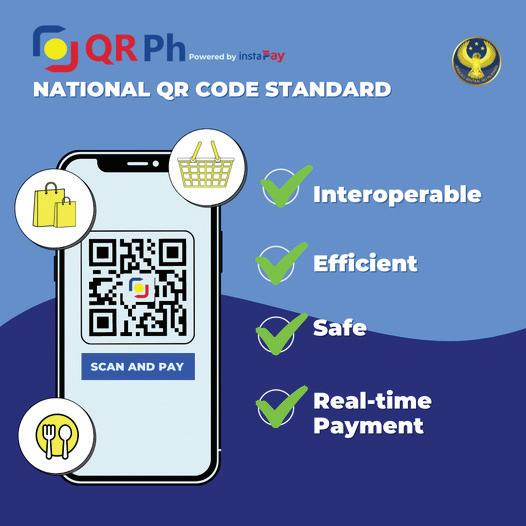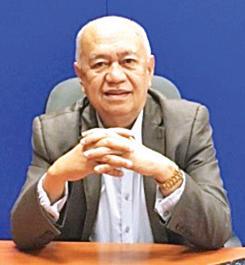
6 minute read
A FUTURE-READY PHILIPPINES: DIGITAL, SUSTAINABLE, INCLUSIVE
Reforms... From C2
Governance, stability, and consumer protection
The BSP highly values corporate governance and transparent reporting and promotes the same among financial institutions. The BSP issued Circular No. 456 in 2004, which promotes fairness, accountability, and transparency in the financial sector. The circular requires its supervised institutions to form audit, corporate governance, and risk management committees with clearly defined charters and reporting relationships. These committees are tasked to ensure oversight and evaluation of financial reporting, internal controls, risk management, corporate governance principles, and the effectiveness of the board itself.
One of the BSP’s key objectives is managing systemic risks. This involves collaborating with financial authorities and utilizing macroprudential policy strategies to address interconnected risk behaviors.
In addition, the BSP places significant emphasis on consumer protection, considering it an integral component of corporate governance, culture, and risk management. To ensure effective supervisory oversight, the BSP adheres to global standards and constantly engages with stakeholders to implement reforms.
The BSP actively participated in the development and implementation of the Financial Products and Services Consumer Protection Act. In compliance with the law, the central bank issued the corresponding rules and guidelines, established a dedicated consumer protection department, and conducted consumer education campaigns for financial consumers.
The BSP also implemented regulations to enhance cybersecurity in the country’s financial system. Through its issuances, the BSP required financial institutions to establish robust information security management systems, manage technology risks, and implement cybersecurity risk management frameworks. These measures aim to protect both financial institutions and consumers from cyber threats, ensuring the integrity and security of the financial system.
Relief measures during the global health crisis
The BSP provided temporary regulatory and rediscounting relief measures to its supervised institutions to ease the impact of the COVID-19 pandemic.
Some of the key measures include the extension of financial relief to borrowers, which allowed banks to stagger the booking of credit losses for individuals and businesses as well as capital relief for provisioning requirements. The BSP also set an interest-rate ceiling for credit card transactions to ease the financial burden on consumers and small businesses. Incentives for lending were also introduced, such as reducing credit risk weights for loans to micro, small, and medium enterprises (MSMEs) and assigning a zero-percent risk weight to loans guaranteed by the Agricultural Guarantee Fund Pool and Agricultural Credit Policy Council.
The BSP also allowed the utilization of loans to MSMEs as an alternative form of compliance with reserve requirements. Other relief measures included the utilization of capital and liquidity buffers, increase in the Single Borrower’s Limit (SBL), relief from sanctions for breaches of the SBL by foreign bank branches, increase in the real estate loan limit, and relaxation of the guidelines on Real Estate Stress Test limits. The BSP also promoted continued access to financial services by waiving transaction fees, providing temporary regulatory relief for banks offering Basic Deposit Accounts, and supporting the delivery of financial services through operational relief measures.
Over the past 30 years, the BSP’s efforts have contributed to a robust and resilient financial system in the Philippines. The central bank has played a vital role in fostering a conducive environment for sustainable economic growth and financial well-being by prioritizing financial stability, risk management, financial inclusion, innovation, and consumer protection for the benefit of all Filipinos.

By Peter Paul Duran
As Al Amanah Islamic Bank of the Philippines (AAIIBP) celebrates its 50th anniversary in 2023, it sets its sights on new horizons, positioning itself as a pioneer in digital banking and spearheading the Islamic banking industry in the country.
In a recent interview with Manila Standard, Alex Bangcola, Chairman and President of AAIIBP, revealed the bank’s aspirations to further strengthen its position in the banking sector.

“We’re off to greater heights in our golden year, serving as a springboard towards a digital banking era,” he stated, emphasizing the importance of “Amanah 2.0” and the sustainability of Islamic banking.
Bangcola elaborated on the significance of a revamped AAIIBP, stating that it represents a transformative phase for the bank.
“Amanah 2.0 signifies our commitment to reimagining our services, embracing digital advancements, and providing innovative solutions to our customers,” he explained. This forward-looking approach aims to enhance customer experience, streamline processes, and leverage technology to deliver cutting-edge Islamic banking services.
In a significant development for the first and only Islamic Banking institution in the country so far, a Swiss project finance company called Soleil Capitale Groupe GmbH (SCG) has acquired a 40% stake in the bank. This strategic investment by SCG not only grants them multiple board seats but also provides an opportunity for AAIIBP to play a pivotal role in the development of the Bangsamoro Autonomous Region in Muslim Mindanao (BARMM) through its expertise in Islamic finance.
With AAIIBP being the sole Islamic bank in the Philippines, this investment opens doors to the fast-growing Islamic finance industry. SCG’s entry into AAIIBP positions the bank to spearhead the development initiatives in BARMM, which requires substantial investments in transportation, communication, health, education infrastructure, and other key sectors. By leveraging SCG’s global network and expertise, AAIIBP aims to attract development funds and promote inclusive progress, trade, tourism, and agriculture in the region.
Furthermore, the interview shed light on AAIIBP’s potential transition to privatization. Bangcola discussed the advantages of this move, stating, “This is a crucial step for Amanah’s future. It will allow us to fully unlock our potential and implement innovative strategies to benefit our clients and the Islamic banking sector.” and the recipient have accounts from different banks or e-wallets.
He added that this transition would provide the bank with greater flexibility, agility, and autonomy to drive growth, expand its offerings, and adapt to the evolving needs of customers.
Discussing the sustainability of Islamic banking, Bangcola highlighted its fundamental principles, which prioritize ethical and equitable practices.
“Islamic banking is a sustainable system that promotes fairness, transparency, and shared prosperity. It aligns with the values of responsible banking, making it an attractive choice for individuals and businesses seeking ethical financial solutions,” he emphasized.
This sustainability-focused approach positions AAIIBP as a trusted institution for those looking to make socially responsible financial decisions.
Under Bangcola’s leadership, AAIIBP has witnessed a remarkable transformation. When he assumed the presidency in 2017, the bank’s Islamic banking transactions accounted for only 15% of its operations. Today, that figure has surged to an impressive 90%, surpassing conventional banking.
This significant shift demonstrates AAIIBP’s commitment to promoting and facilitating Islamic finance, while also catering to the diverse financial needs of its clientele. Looking ahead, AAIIBP plans to expand its presence nationwide, aiming to double its current nine branches. Bangcola emphasized the bank’s unwavering dedication to the development and upliftment of the Bangsamoro Autonomous Region in Muslim Mindanao (BARMM). By increasing accessibility to Islamic banking services and facilitating economic growth, AAIIBP seeks to contribute significantly to the region’s prosperity and advancement.
Al Amanah Islamic Bank stands as a beacon of trust, inclusivity, and ethical banking principles in the Philippines. As it celebrates its remarkable journey, AAIIBP remains dedicated to leading the way in Islamic banking, continually pushing boundaries, and forging a path towards a future where financial innovation meets social responsibility—beyond personal belief, beyond religion, and beyond boundaries.
On safety, the BSP issued regulations and carried out campaigns that promote consumer protection and cybersecurity.
The BSP also supported the passage of the Financial Products and Services Consumer Protection Act when it was still being deliberated in Congress. This law provides better redress mechanisms for financial consumers who have complaints against their service providers.
On inclusivity, the BSP, through its Financial Inclusion Office, has implemented policies and programs that made financial services more accessible to low-income earners and encouraged more people to open transaction accounts. At the fore of these initiatives is the Paleng-QR Ph Plus program, under which the BSP partners with the Department of the Interior and Local Government to urge local governments to promote digital payments in local wet markets, public transport, and other retail establishments.
As the speed and breadth of digitalization gain momentum, the BSP continues to pursue more innovative and inclusive strategies toward an efficient, safe, and inclusive payments and settlements system attuned to the evolving needs of Filipinos.

PH opens World Cup bid against Switzerland
THE Philippine women’s national football team will open its FIFA Women’s World Cup 2023 campaign against Switzerland La Nati in New Zealand.
“Switzerland is another highlyquality team. Right off the bat, we know they’re going to be very good,” said Sarina Bolden, one of the Filipinas’ star players, in an interview with FIFA +.
The Filipinas will have the La Nati side as their first opponents on July 21 at the Forsyth Barr Stadium in Dunedin.
Bolden, who has recently joined the West Sydney Wanderers, has joined the Filipinas in their practices in Sydney.
The Ferns will be their next opponents on July 23 at the Wellington Regional Stadium in Wellington.
“They’re all very tough opponents. I’ll start with New Zealand because luckily we’ve had a little bit of experience against them,” added Bolden.
The Filipinas have learned of the strength of the Ferns when the took a 1-2 setback during a friendly.
Norway will be the Philippines’ last opponent in the group stage on July 30.
“And then Norway are former world champions. So that’s the one. Obviously that is probably going to be our toughest game of the group stage, but it’s going to be a really great opportunity to even play a team like that,” said Bolden.
The Filipinas’ pre-World Cup camp is ongoing at the Western Sydney Wanderers Complex.
Veterans like co-captains Hali Long and Tahnai Annis are among the players listed, along with mainstays Olivia McDaniel and Inna Palacios. Peter
Atencio










